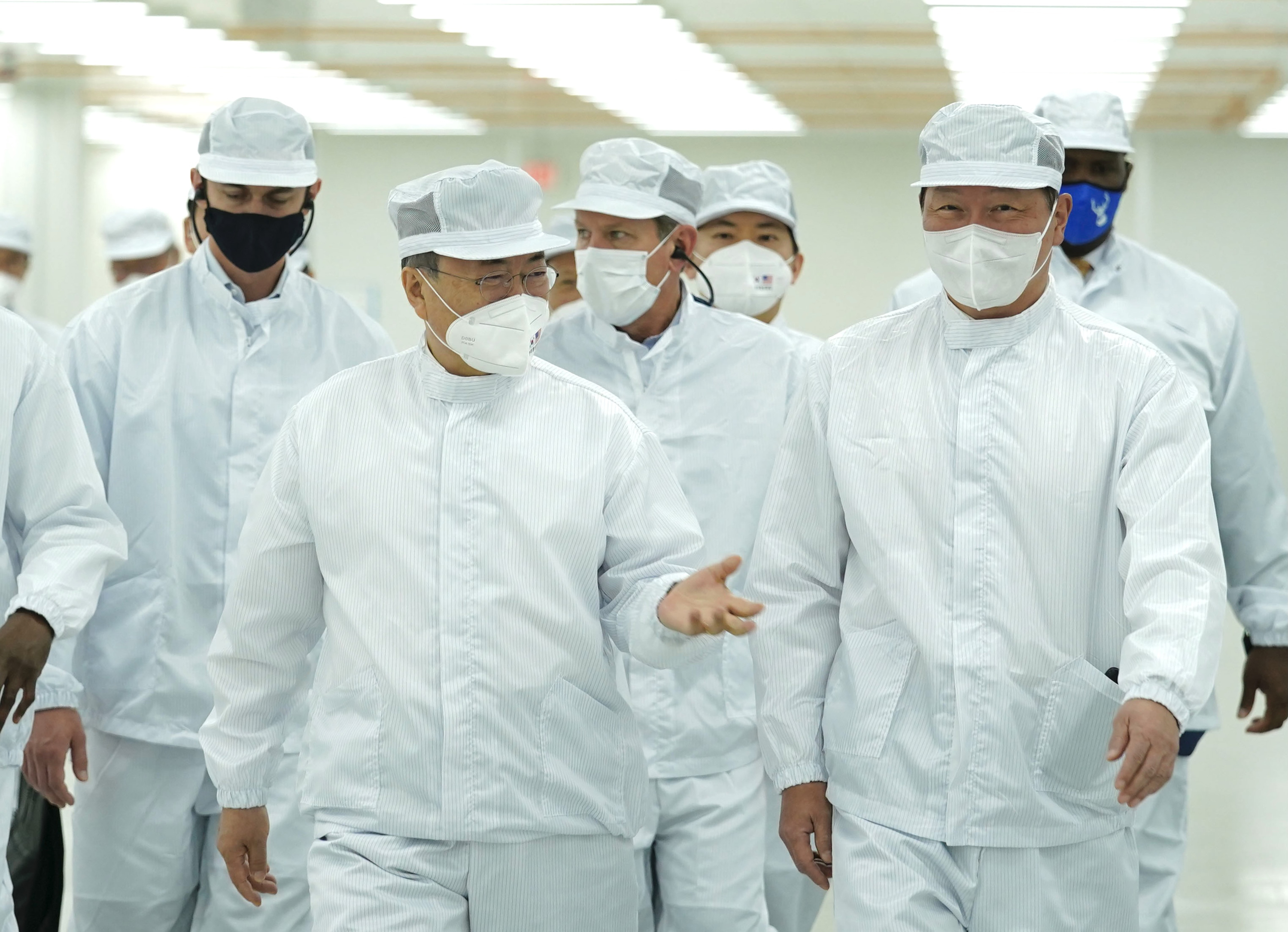Korean battery companies strengthen presence in U.S.
Date Jun 09, 2021
 President Moon Jae-in, left, talks with SK Group Chairman Chey Tae-won during a visit to SK Innovation’s battery plant facility in Georgia, U.S., May 22. Courtesy of Presidential Office of Choeng Wa Dae
President Moon Jae-in, left, talks with SK Group Chairman Chey Tae-won during a visit to SK Innovation’s battery plant facility in Georgia, U.S., May 22. Courtesy of Presidential Office of Choeng Wa Dae
●US$40 billion deal to benefit both Korean conglomerates and U.S. businesses
●US$14 billion earmarked to build EV battery production plants, form joint ventures with U.S. companies
In line with the Biden administration’s pursuit of eco-friendly energy innovation and high-tech supply chains, Korea’s leading conglomerates are leaping at the chance to increase their presence in the U.S., benefiting that country’s employment as well as mutual economic growth.
The win-win strategic cooperation between the two countries came into focus with President Moon Jae-in’s recent visit to the U.S., accompanied by top Korean conglomerates’ investment pledges of around US$40 billion to establish manufacturing plants and related infrastructure in the U.S. in the years to come.
During the bilateral talks, the two leaders had discussions on promoting mutual investments and joint technology development in various sectors, including electric vehicle (EV) batteries and semiconductors. To turn the subject of these discussions into realities, Korea-headquartered global businesses came up with various joint ventures and investment plans in the U.S. on the sidelines of the summit.
Among the US$40 billion to be invested by Samsung, Hyundai, LG and SK, ranging from semiconductor foundry plant construction to future car development, the most notable sector is the EV battery manufacturing business. LG Energy Solution (LGES) and SK Innovation (SKI) will spend a combined US$14 billion to build EV battery production plants as well as form joint ventures with leading U.S. firms.
LGES vowed to invest over 1 trillion won (approx. US$1 billion) to build a second EV battery cell mega-manufacturing factory for Ultium Cells LLC, its 50:50 joint venture with General Motors. By 2023, the two companies will jointly inject more than US$2.3 billion won into the battery plant, which will open in Spring Hill, Tennessee, creating more than 1,300 new jobs. The new 2.8 million-square-foot factory will be built on land leased from GM and will supply battery cells to GM’s Spring Hill assembly plant.
SK Innovation is also making quick strides toward the all-electric future envisioned by the Biden administration. SKI and major U.S. carmaker Ford signed a memorandum of understanding earlier this month to establish a joint EV battery-manufacturing venture dubbed BlueOvalSK, at a cost of 6 trillion won. Aiming to launch operations at the factory by 2025, the facility will be able to produce battery cells and modules with an aggregate output of 60 gigawatt-hours annually.
In addition, SKI is currently building two plants in the U.S. state of Georgia. The construction of its first factory is nearly finished with production slated to kick off later this year. The second plant, which is about 20 percent complete, is scheduled to start production in 2023. The production capacity of both is estimated at around 21.5 gigawatt-hours. SK is seeking to add two more plants in the United States.
Considering the projected growth of the EV market in the U.S. in the coming years and the Biden administration’s full support for eco-friendly transportation technologies, Korean conglomerates could benefit by expanding their market share in the U.S. economy via the joint ventures as well as other types of strategic partnerships with global carmakers. Suppliers based in Korea could also enjoy benefits from being included in the value chain. For the U.S., securing solid cooperation in the cutting-edge battery sector on its own turf carries significant weight not only for competing with China but also creating jobs to boost its economy.

The Ministry of Culture, Sports and Tourism's "Korea Here & Now" work can be used under the condition of "Public Nuri Type 1 (Source Indication)."




